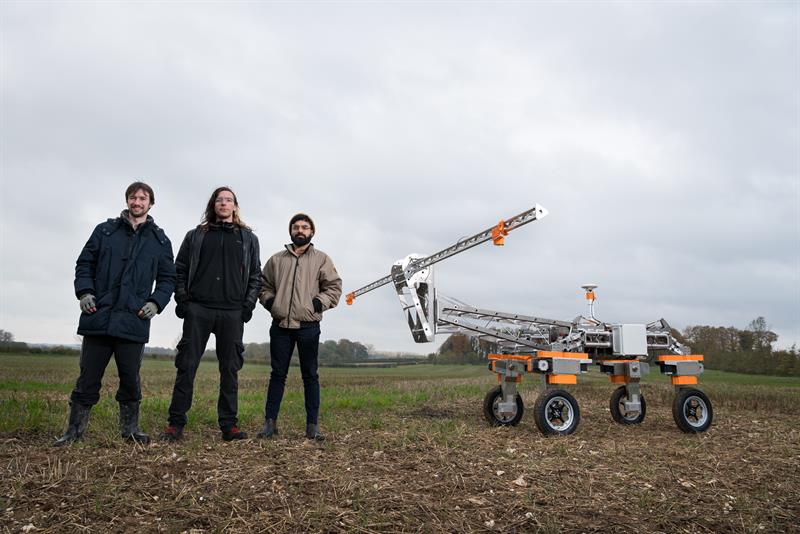Using electricity and artificial intelligence, the ‘Dick’ robot will zap individual weeds using commercially-proven RootWave weed zapping technology. Early field trials are due to commence in 2020.
This is a major technological milestone which will enable automated, precision, per-plant weeding both at scale and autonomously, for the first time providing a post-glyphosate future for arable farmers.
This project is funded by the government’s Innovate UK grant programme, with more than £1 million funding committed to date. Working together in partnership with British start up RootWave, Small Robot Company has successfully completed development of its ‘Dick’ non-chemical weeding robot prototype to in-lab proof of concept stage, Technology Readiness Level (TRL) 4.0. An initial prototype will go into field trials in 2020, with the commercial weed zapping service anticipated to be available from autumn 2021.
With up to 95% of chemicals wasted in the current farming system, this new non-chemical weeding technology will be significantly more nature-friendly and better for biodiversity.
SRC has also launched its next generation Tom robot. Its first robust commercial robot, Tom is delivering SRC’s first commercial service for weed mapping.
“For the first time, we can see each plant in the field - and every single weed. Instead of spraying the whole field, we can simply zap the individual weeds,” said Sam Watson-Jones, co-founder, Small Robot Company. “Farmers are integral to the environmental solution. It’s crucial that we're working on farm to develop our technology, to ensure it delivers real benefits in field. Together, we're creating the ultimate sustainable farming model."
Andrew Diprose, CEO, RootWave commented, “Our technology uses electricity to zap weeds with zero chemicals. Increased regulation, herbicide resistance, and consumer concerns are all intensifying the urgency to find an environmental solution. Partnering with Small Robot Company means we can automate our weed zapping to operate at farm-scale.”
With pressure increasing from regulators and herbicide resistant weeds, RootWave has developed a scalable and sustainable alternative to herbicides. This provides the core technology for SRC’s new weed-zapping robots. The technology is sustainable, no-till and cost comparable with herbicides. Automating this technology at scale will bring significant cost savings for farmers.
Rootwave uses electricity to kill weeds. Electricity is applied to a weed where the natural resistance of the weed transforms the electrical energy into heat which boils it inside out from the root upwards. This kills the weed after which the plant naturally decomposes, returning its nutrients to the soil. RootWave treats deep into the roots, making it possible to treat any weed, including tough invasive species such as Giant Hogweed and Japanese Knotweed.
RootWave’s technology is already commercially available as a professional hand-weeder designed for growers, gardeners and groundskeepers to spot weed and treat invasive species.
RootWave has won a £1million UK Government Innovate UK grant to scale its technology across different crop types and weeding platforms, including the Small Robot Company’s autonomous robots. The other major partner is SFM Technologies who are using RootWave technology to develop a tractor-pulled clearance weeder for fruit crops . These integrations will help enable electrical weed control technology to be adopted as a scalable and sustainable alternative to herbicides.
Small Robot Company has won more than £1million in Innovate UK grants to date, including an £800,000 grant for its ‘Wilma’ artificial intelligence weed recognition and ‘Tom’ weed mapping technology. This was one of the largest single agritech grants made under Innovate UK’s innovation scheme in 2018.

The Small Robot Company's tech team with their next generation weed mapping robot Tom
Tom will cover 20 hectares per day autonomously, collecting about 6 terabytes of data. He can distinguish plant details at submillimetre resolution, with less than one millimetre per pixel resolution on the ground. He is robust and weather-proof and can be used all year round. The next generation Tom also incorporates increased speed, 5K camera capacity and extended battery life.
The ‘Tom’ robot weighs approximately 150kg, with dimensions being 1.8 (length) x 1.2 (height) x 1 (width) metres in size, with a 4 metre boom. In comparison, traditional tractors are approximately 12m x 2.5m and weigh around 20 metric tonnes. This weight causes damage to land due to compaction, which is made worse if tractors are used in wet weather.
“This is the major delivery milestone we set out to achieve with our £1.2 million Crowdcube investment round last year. The huge stride is that we will offer a commercial service,” commented Ben Scott-Robinson, co-founder, Small Robot Company.
“Tom can gather data at two hundred times the pace that the first generation Tom could do. Robust, weather-proof and farm-scale. It's been amazing to go from the drawing board to a situation where we have robots in the field collecting information that customers are paying for in the space of a few months.”













